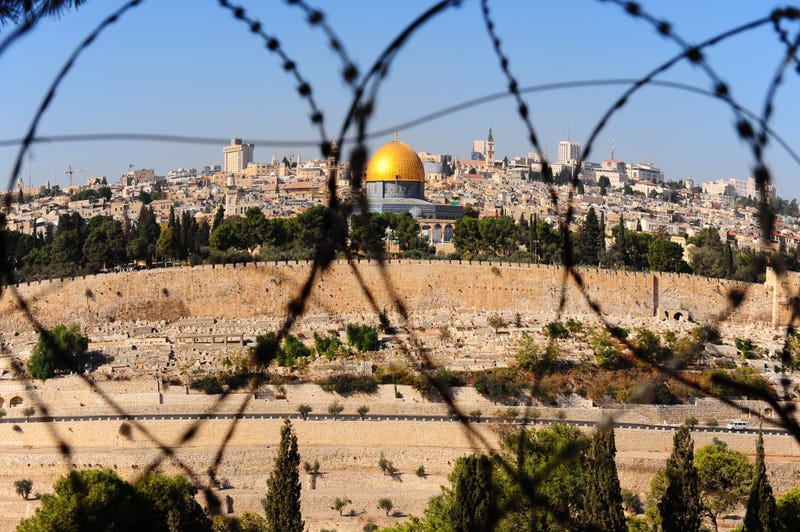
PHILADELPHIA (KYW Newsradio) — An uptick in violence across Israel and Gaza has prompted Israelis and Palestinians to hunker down in bomb shelters, with no end in sight. Political experts in Philadelphia say a number of concurrent conflicts are leading tensions to a boiling point.
Dr. Asaf Romirowsky, executive director of Scholars for Peace in the Middle East, says an attempt by Palestinian Authority leader Mahmoud Abbas to cancel the upcoming Palestinian elections has prompted internal fighting.
He says there is a power struggle between the PA, which exercises civil control over Gaza and the West Bank, and the fundamentalist organization Hamas.
Israelis, too, are struggling with their own leadership. Prime Minister Benjamin Netanyahu just scraped by to hold onto his political position. Romirowsky says conducting four elections in Israel the last two years has led to political instability.
University of Pennsylvania political science professor Dr. Ian Lustick says, in the midst of the Israeli political crisis, no government can be formed. And any chance of it has been postponed — if not prevented — by the violence that, he says, exposes Netanyahu to criticism.
The tensions could trigger a "rally around the flag effect" that would "postpone his day of reckoning with the courts." (Netanyahu is currently defending himself in a corruption trial.) And that, says Lustick, could lead to yet another election.
"It’s very difficult to negotiate situations when you have unstable political leadership," says Drexel political science professor Dr. Bill Rosenberg.
Lustick says this most recent conflict is an inevitable "flare up" of tensions since the last significant escalation of violence in the region in 2014.
"We see that, inside of Israel, Palestinians are more active politically. No government can be formed without their participation in the coalition apparently," he said. "And for Palestinians in Gaza, since the Palestinian elections were canceled, it’s really the only avenue they have to get themselves on the political map. It’s a bloody one, but not an unusual one."
Lustick says the cancelation of Palestinian elections prevent Hamas from political participation outside of Gaza. And with Hamas's interest in presenting itself as a national force, he adds, it would be to their advantage to be involved in whatever happens in other territories, including the West Bank and East Jerusalem.
"Hamas is not allowed to insert itself into Israeli policies in the West Bank or Jerusalem or anywhere else. Hamas is trying to change the rules of the game, and Israel's trying to restore the old rules, and that's the battle," hs said.
The political climate is such that neither side has incentive to stop the conflict at this point, Rosenberg said.
"Benjamin Netanyahu wants to make a forceful perspective that 'We’re not gonna put up with violence against our own citizens.'"
Rosenberg points out that this is the first major clash since the 2020 Abraham Accord, in which Israel normalized relations with the UAE and Bahrain.
"I think the Palestinians are trying to make a stand where they’re saying, 'Hey, don’t forget about us.'"
Meanwhile, there are ongoing religious tensions in East Jerusalem. On Monday, Jerusalem Day coincided with the Islamic holy month of Ramadan. Jerusalem Day commemorates the city's 1967 reunification and the establishment of Israeli control, and Rosenberg says the conflicting celebrations served as a flashpoint at Al-Aqsa Mosque.
"Jews like to go to the Dome of the Rock, because that was the site of the Holy of Holies, the Temple. It also was the site where Mohammed was said to have ascended to heaven; and the mosque there is one of the holy sites for the Muslims," Rosenberg explained.
"Jews have ceded political control over the top of the area where the dome is located to the Jordanians, but it's still a point of conflict. Jews are not supposed to go to the upper platform to pray, they're relegated to the Wall to pray, and that's caused a lot of tension for decades."
At the same time, the Israeli supreme court was set to decide a land dispute that dates back to 1993, regarding Jewish property rented by Arabs.
"And part of the issue is that Palestinians have the same claims inside the current state of Israel, where they feel they lost their land and can't go back and reclaim their homes and so forth," Romirowski said.
This land dispute prompted hundreds of rockets to be aimed at Israel from Hamas in Gaza, Romirowski says, to which Israel retaliated. And there are additional outlying factors, he says.
"Many of the missiles that have been coming out of Hamas into Israel are Iranian made," he said. "And so when you’re talking about the connection, as far as the regional instability factors, there is of course Iranian foot prints on all of this."
Rosenberg says the conflict will probably be solved, in the long term, through negotiation.
"What we're seeing now is a flare-up of the tension that exists, and I don't see it ending in the next couple of days."
Some scholars say it will require mediation from another country, such as the United States. The last time regional tensions got this bad was in 2014, and the Egyptian government was able to step in and mediate.
Romirowsky points out this is all happening at a time when countries all over the world are trying to usher in a post-pandemic economic recovery.
"Israel was about to open up next week, as far as flying in and out for non-Israelis," he said.
In response to the violence, though, many U.S. airlines this week cancelled flights to Israel.
